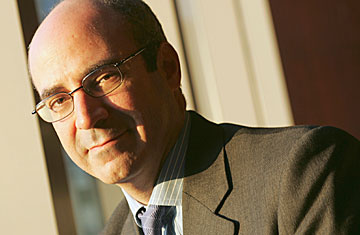
William Browder, chief executive of London-based Hermitage Capital Management, spends most of his energy these days shaming the Russian government
(2 of 2)
When the case was introduced at Harvard in late October, Browder went to address the class and his message seemed to connect. "Some of the students actually cried," says Aldo Musacchio, the professor who taught the course. Others went away feeling that the Russian government was one big crime family. "Even from reading the case, it seemed to play out like a mafia movie," says Adolfo Morales, one of the students in the class. "The obvious conclusion was that Russia is kind of like a mob."
Because Harvard's case studies are the standard for business schools everywhere, this idea will soon be presented to many of the whiz kids who will one day control the global economy. It will, in Browder's words, "literally be the textbook example of the cost of corruption in emerging markets." The impact of that is impossible to quantify but easy enough to imagine. Several years ago, Juan Aristi studied a version of Browder's story during his MBA program at Columbia University. He is now a strategist at a global-consulting firm whose clients include governments and major corporations. "It was shocking," he recalls. "I guess the lesson was in Russia you are always at the mercy of powerful men and police." So would he now advise his clients to invest? If they have serious Kremlin connections, maybe. "But even then, it's not for sure," Aristi says.
Now extrapolate how many Aristis this case will create. How many future consultants, fund managers, central bankers and politicians will internalize Browder's narrative? By any measure, it is a coup for his campaign and a creeping disaster for Russia's image. And that is where Moscow may cry foul. Many foreign businesses have had enormous success in Russia while Browder's story is a kind of worst-case scenario. Even Ray Fisman, the Columbia professor who co-wrote the new case with Harvard, admits as much. "It is a tail risk, an extreme outcome," Fisman told me.
But seeing through that tail risk to the bigger picture of Russia's economy will mostly be up to the students, and it can be easy to miss amid the force of Browder's storytelling. Subtlety is not his strong suit, and he often slips into the fire-and-brimstone language of a televangelist. Describing Magnitsky's death, he told me, "It's almost like a story of divine virtue. Here is a young man who believes in truth and goodness, stands up against an evil regime and gets punished in this horrible way." Many people might agree with that, but it is hard to call such statements objective. The case study itself is much less breathless, describing Browder's ordeal this way: "The sheer number of government officials and private individuals that must have been involved in the elaborate scam [against Browder's fund] suggested a sophisticated and well-connected adversary."
But objectivity is not exactly Browder's goal. His goal is to make Magnitsky's tormentors pay. He wants all of the officials implicated in the case to be put on trial or otherwise punished. As of Nov. 16 — the two-year anniversary of Magnitsky's death — Russia has not obliged. No investigations have been opened into the eight most senior officials linked to the case, including detectives, judges, prosecutors and a general of the FSB, Russian security service. All of them have either kept their jobs or been promoted. Only two prison doctors have been charged with criminal negligence, despite the evidence allegedly linking Magnitsky's case to officials in various hierarchies.
So Browder is pressing on, and thus far, Russia is making no public effort to refute him. (The only response, Browder claims, have been death threats, 11 of them, sent anonymously by SMS, e-mail and voicemail.) When I asked Ketchum, the New York City–based public-relations firm that manages the Kremlin's image in the West, whether they had any strategy to counter Browder's campaign, they gave me a curt "no comment." In 2006, Putin gave a similar response when a reporter asked him why the American investor had been blacklisted. "To be honest, I don't know why this particular person has been refused entry to Russia," Putin said. But if he hadn't heard of Browder then, he certainly has by now.
